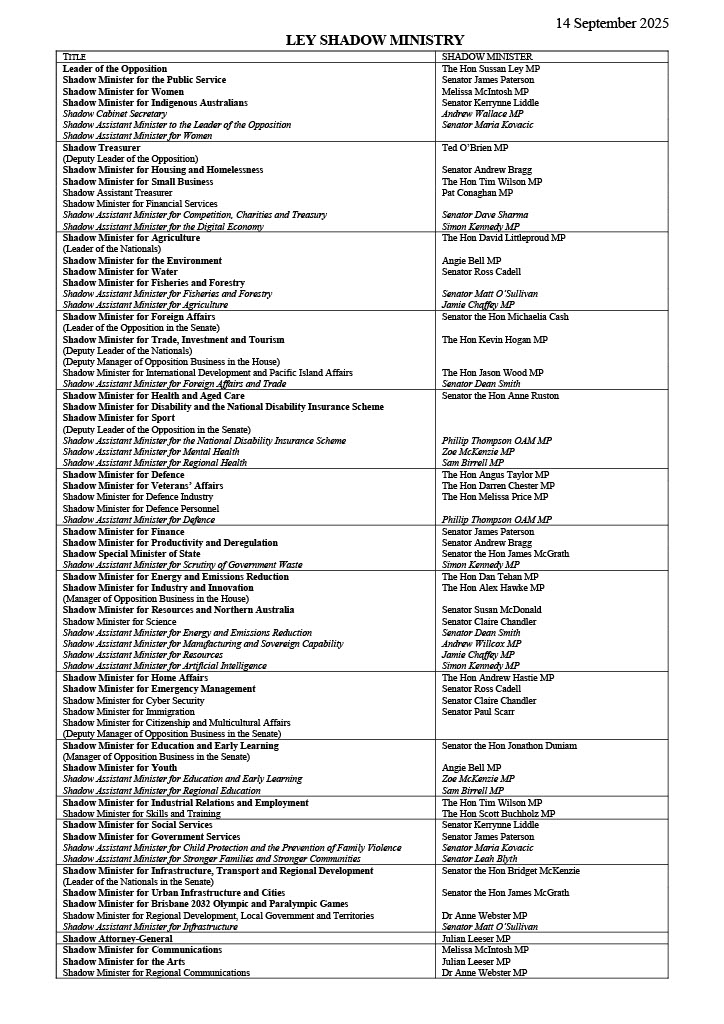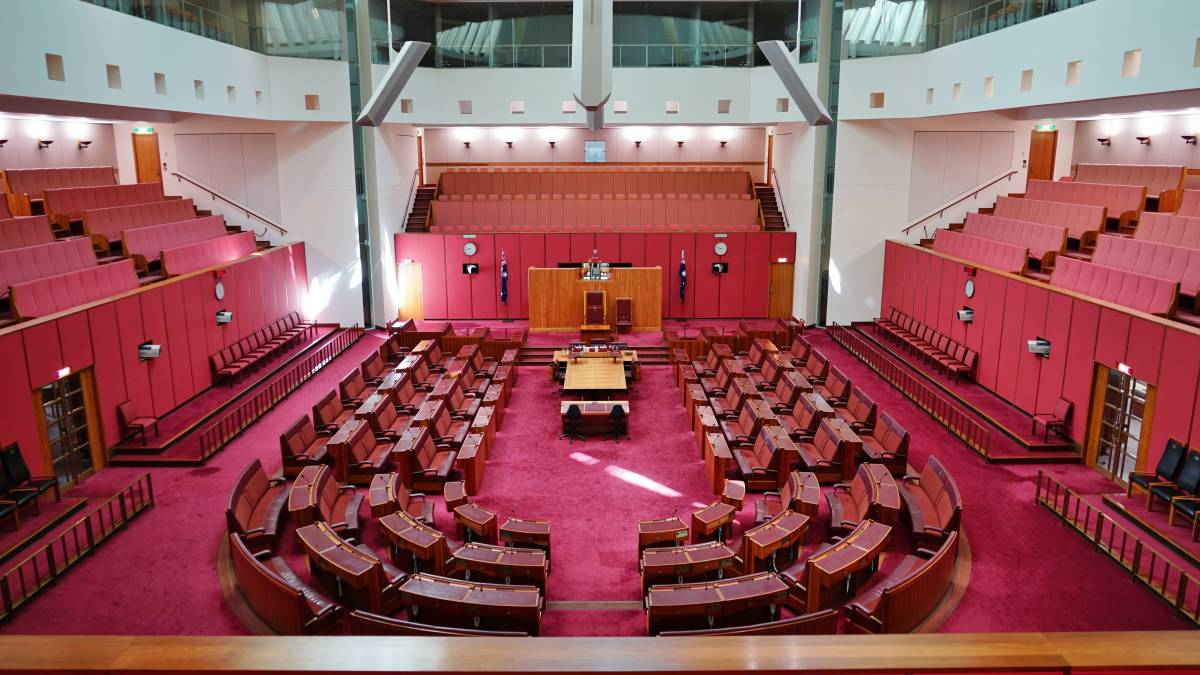It is often said that an experienced shuffler can rearrange a 52-card deck in under twenty-five seconds.
Political leaders are no different, moving ministers and shadow ministers to assemble the right combination to pursue their goals.
With Opposition Leader the Hon Sussan Ley MP unveiling her first shadow ministry reshuffle this week, join Nexus APAC as we examine the new shadow ministry and its implications for federal politics.
On Sunday, following the removal of Senator Jacinta Nampijinpa Price as Shadow Minister for Defence Industry and Shadow Minister for Defence Personnel, the Opposition Leader unveiled her new shadow cabinet. Senator Nampijinpa Price’s demotion followed her refusal to express support for the Ms Ley’s leadership of the Liberal Party at a press conference.
The Hon Melissa Price MP replaces Senator Nampijinpa Price in the defence industry and defence personnel portfolios. Ms Price held the position of Minister for Defence Industry in the Morrison government. Tasmanian Senator Claire Chandler takes over Ms Price’s former role as Shadow Minister for Cyber Security and Shadow Minister for Science.
Simon Kennedy MP has been appointed to the newly created role of Shadow Assistant Minister for Artificial Intelligence, Shadow Assistant Minister for the Digital Economy and Shadow Assistant Minister for Scrutiny of Government Waste. This represents the first shadow ministerial position dedicated to artificial intelligence.
The Opposition Leader has also elevated Shadow Finance Minister, Senator James Paterson, into the Opposition’s formal leadership team, stating “it is appropriate that he joins the group as that work takes shape” owing to his central position “developing [the Coalition’s] economic agenda”.
The Opposition Leader will be hoping her reshuffled shadow ministry proves a winning hand as she positions for the final sitting weeks of the calendar year.
 The Coalition and the Youth Vote
The Coalition and the Youth Vote
A new RedBridge poll has found that low levels of support among younger voters and women put the Coalition at risk of ‘permanent opposition’.
The online poll of over 5,300 voters found that, on a 2PP basis, while the Coalition leads among Baby Boomers (54 percent to 46 percent) and ties when it comes to Generation X (50 percent to 50 percent), Labor is well ahead among Millennials (59 percent for Labor, 41 percent for the Coalition) and Generation Z (68 percent for Labor, 32 percent for the Coalition).
In addition, Labor leads the Coalition among male voters (52 percent for Labor, 48 percent for the Coalition) and more significantly among female voters (55 percent for Labor, 45 percent for the Coalition).
In geographical terms, Labor continues to enjoy firm support among the 88 inner and outer metropolitan seats, with the Liberal Party holding only 9. This lead is also reflected across the states and territories with the exception of Queensland, where the Coalition leads 51 percent to 49 percent.
First Speeches
The previous sitting period also saw the continuation of first speeches in both chambers, giving newly elected Members and Senators the chance to introduce themselves to Parliament and outline their priorities formally.
Mr Matt Smith MP, Member for Leichhardt, Australian Labor Party
Standing at 2.10 metres and known as a former Cairns Taipans basketballer, Matt Smith is the tallest member of the House and used his first speech to highlight his strong ties to Far North Queensland, particularly Cape York and the Torres Strait. He spoke with pride about the beauty, culture, diversity, and history of his electorate, describing Leichhardt as “the most Australian place in Australia.”
Smith also underscored the urgent and tangible impacts of climate change, especially on Torres Strait communities, and emphasised the need to recognise and preserve Indigenous languages and cultures, for example, noting that many children in Aurukun first speak Wik. He advocated passionately for protecting the environment, elevating remote and Indigenous communities, and ensuring the Federal Parliament pays attention to issues too often overlooked in tropical and far northern Australia.
Senator Richard Dowling (Tasmania), Australian Labor Party
In his first speech to the Senate, Senator Dowling centred his remarks on intergenerational fairness and the need to expand genuine economic opportunity for all Australians, with a particular focus on younger generations. He reflected on his Tasmanian upbringing, public schooling, and working-class family background, presenting these experiences as the foundation of his values.
An economist by training, Dowling underscored the importance of lifting national productivity and modernising the economy through clean energy and innovation. He argued that Tasmania’s abundant natural resources position the state to play a pivotal role in this transition.
A recurring theme was the imperative to ensure young Australians are not left behind, with pointed references to housing affordability, student debt, and secure employment. He urged that politics remain practical and people-focused, and called for real outcomes that restore trust and guarantee future generations opportunities equal to, or greater than, those enjoyed in the past.
Senator Corrine Mulholland (Queensland), Australian Labor Party
Senator Corinne Mulholland drew headlines by cradling her eight-month-old son, Augie, throughout her first speech, acknowledging that his bedtime was near, and describing him as a constant reminder of why she entered politics.
At the heart of her remarks was the lived reality of working parents. She spoke candidly of the “mess, the chaos, the juggle, the struggle,” as well as the “magic and the mayhem” of raising children, stressing that parents should not only be symbolically represented in Parliament but be fully present in practical, visible ways.
Mulholland pledged to champion genuine choice and flexibility in how, when, and where Australians work, pressing for modern workplaces that accommodate caregiving responsibilities. Drawing on her own campaign experience, nursing Augie at just three months old, she highlighted the challenges of balancing public life with family life.
Beyond family and workplace reform, she urged structural change to support parental caregiving, make life easier for working families, and ensure political institutions evolve to reflect the realities of modern family life.
Stay tuned for more Nexus APAC insights as we continue to track the issues that matter most in Canberra.
Latest posts by Nexus APAC (see all)
- Examining Medicine Shortages in Australia - February 7, 2026
- The Secretaries of Federal Departments - January 31, 2026
- Merry Christmas from the Nexus APAC Team - December 19, 2025



